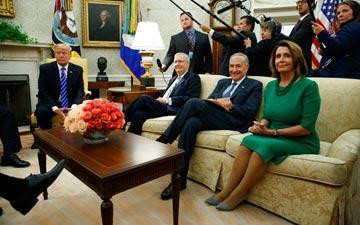
Looking to America's Mission Statement
(AP Photo/Evan Vucci)
Ann Skeet is the director of Leadership Ethics at the Markkula Center for Applied Ethics. Views expressed are her own.
This article was originally published in MarketWatch on September 7, 2017.
President Donald Trump’s decision to rescind the Deferred Action for Childhood Arrivals program, or DACA, and then ask Congress for a law to resolve this thorny immigration issue, underscores an ethical dilemma faced by people in formal leadership roles.
It is a common challenge for those in top jobs who have one title but many roles and duties that are, at times, in conflict with one another. How can leaders meet these challenges?
The president is the country’s chief legislator, commander-in-chief, chief diplomat, administrator, and magistrate. The responsibilities are identified in Article II, Section 3 of the U.S. Constitution, which states, "He shall from time to time give to the Congress information of the state of the union, and recommend to their consideration such measures as he shall judge necessary and expedient."
Some see Trump’s direction to Congress earlier this week to “legalize DACA,” without recommending his own legislation, as lacking executive leadership. Trump has chosen to place greater weight on his duties as chief magistrate, to “take care that the laws be faithfully executed” than the power he has to recommend new laws.
In contrast, former President Barack Obama chose to emphasize his role as chief executive, using an executive order to create DACA and grant a reprieve of the laws as applied to young immigrants he identified as contributors to our country and owed certain rights.
It is not uncommon for different people in the same position to emphasize different aspects of their role as a signal of their leadership priorities. Trump’s DACA decision follows through on an oft-stated campaign promise. He is both demonstrating compassion for those affected, and is allowing Congress to play its role by drafting this important immigration legislation. These are all positive elements of ethical leadership.
We offer a framework for ethical decision-making at the Markkula Center for Applied Ethics. It prompts people facing challenging decisions to ask questions to weigh rights and perspectives that can be add odds with one another, drawing on philosophical traditions. These include: Which option produces the most good or does the least harm? Which protects the rights of all who have a stake? Which treats people equally or proportionately? Which best serves the community as a whole? Which leads me to act as the sort of person I want to be?
Two additional areas of position and mission can aid leaders faced with such dilemmas, namely: What do the duties of my position call for me to do, and which interests am I asked to protect? What is the mission of the organization or group I am leading? Am I acting in a way that is consistent with that mission?
I view this well-known sentence from the Declaration of Independence to be our country’s vision statement, our aspirations for a future ideal: “We hold these truths to be self-evident, that all men are created equal, that they are endowed by their Creator with certain unalienable Rights, that among these are Life, Liberty and the pursuit of Happiness.”
What about guidance the president and Congress can find in the country’s mission? Scholars and courts have turned to the Constitution’s preamble as embodying the purpose and principles of our federal government. To me, this serves as America’s mission statement:
“We the People, in Order to form a more perfect Union, establish Justice, insure domestic Tranquility, provide for the common defence, promote the general Welfare, and secure the Blessings of Liberty to ourselves and our Posterity do ordain and establish this constitution for the United States of America.”
Presidents take an oath to uphold the Constitution. Can we find additional guidance from the document’s principles? Take the preamble and derive some questions from it, an exercise I recommend for organizations seeking to define ethical behavior and decisions.
Does this option offer justice? Is it fair, treating people equally or proportionately?
Does this option insure domestic tranquility? Does it keep the peace?
Does this option provide for the common defense — keeping our country safe from attack?
Does this option promote the general welfare — the health, happiness, and fortunes of a person or group?
Does this option secure the blessings of liberty — a freedom from oppressive restrictions for people now and in the future?
Congress has other places to turn for direction. Each of the U.S. departments represented in the cabinet has a mission statement. For example, here’s the mission statement for the Department of Defense: “Create a more secure, democratic and prosperous world for the benefit of the American people and the international community.”
If Congress can use questions derived from mission and purpose of both the U.S. and the federal government to address young people currently without immigration status because of decisions made by their parents, then legislation should emerge that garners broad-based support and is signed by the president.